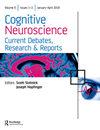将个体差异纳入机制化的具身认知神经科学。
IF 2.2
4区 医学
Q3 NEUROSCIENCES
Cognitive Neuroscience
Pub Date : 2024-07-01
Epub Date: 2024-09-21
DOI:10.1080/17588928.2024.2405190
引用次数: 0
摘要
评论文章《具身认知神经科学的理论策略》提出,具身认知框架可用于对认知神经科学现象进行机理解释。在我们的评论中,我们认为对这类现象的任何机理解释都必须能够解释认知中的个体差异,而个体差异是构成具身认知的各种大脑-身体-环境体验的必然结果。我们认为,虽然机械论的解释可以模拟个体差异,但机械论模型的定义可能会限制其在个体差异研究中的应用。本文章由计算机程序翻译,如有差异,请以英文原文为准。
Incorporating individual differences into a mechanistic embodied cognitive neuroscience.
The review article Theoretical strategies for an embodied cognitive neuroscience proposes that the embodied cognition framework can be applied to develop mechanistic explanations for cognitive neuroscience phenomena. In our commentary we argue that any mechanistic explanation of such phenomena must be able to account for individual differences in cognition that are an inevitable consequence of the varied brain-body-environment experiences that comprise embodied cognition. We propose that, while mechanistic accounts may be able to model individual differences, the definition of mechanistic models may limit their application to the study of individual differences.
求助全文
通过发布文献求助,成功后即可免费获取论文全文。
去求助
来源期刊

Cognitive Neuroscience
NEUROSCIENCES-
CiteScore
3.60
自引率
0.00%
发文量
27
审稿时长
>12 weeks
期刊介绍:
Cognitive Neuroscience publishes high quality discussion papers and empirical papers on any topic in the field of cognitive neuroscience including perception, attention, memory, language, action, social cognition, and executive function. The journal covers findings based on a variety of techniques such as fMRI, ERPs, MEG, TMS, and focal lesion studies. Contributions that employ or discuss multiple techniques to shed light on the spatial-temporal brain mechanisms underlying a cognitive process are encouraged.
 求助内容:
求助内容: 应助结果提醒方式:
应助结果提醒方式:


